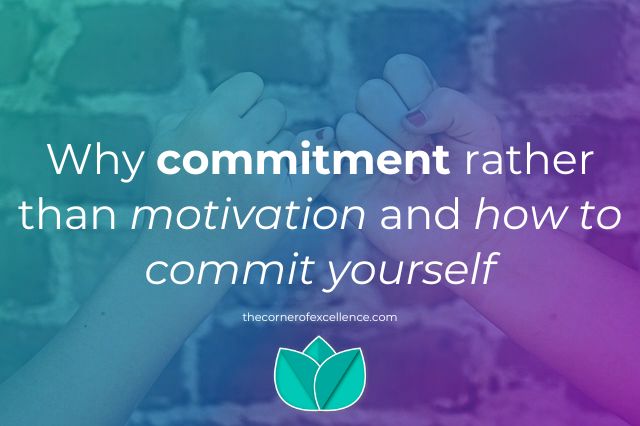There is usually a lot of talk about how to improve our motivation. But motivation depends on our willpower. Find out why you should rather trust commitment. Then we will see how to make a commitment to yourself in order to achieve what you want.
What is motivation
The word motivation derives from the Latin motivus or motus which means “cause of movement”. In other words, it is a reason to get moving. We can define motivation as an impulse that encourages us to action. We feel the will and interest to perform certain actions. Therefore, motivation depends on our willpower.
The problem with motivation
However, our willpower is limited. So motivation can falter. We start something because we feel enthusiasm. We feel very motivated and in the mood to carry it out. The first days we will be excited. But there will come a time when we do not feel like it that much.
We may run into challenges and difficulties. Or perhaps other issues arise that prevent us from spending time on what motivated us. We want to move forward but for whatever reason we do not manage. Then our motivation gradually fades.
The trap of getting used
Another factor to keep in mind is that we get used to things. Let us say you move house. You will be excited first. But over time you tend to take your new home for granted.
Maybe you get a salary increase. At first you work with more motivation. But after a while the incentive of the new salary fades and becomes normal.
The same happens to us with many other things. This can be stuff we buy or projects and activities that we undertake. The novelty fades. This makes it difficult for us to keep motivation high.

What to do when motivation falters
So, the question is, what we can do when our motivation fails? How to progress with what excited us so much at the beginning? Well, it will be commitment that allows us to continue.
What does commitment mean
Commitment means entering into an obligation, promise or declaration of intent. It means following a plan even if we do not feel like it that day. Commitment means fulfilling your obligations and carrying out what has been entrusted to you or what you have put your mind to.
Be it your family, work, studies or projects, if you commit to them you put the effort to live, plan and act in a way that benefits them. You provide your capabilities and resources to contribute to their functioning.
When we do not feel like something, it will be commitment that helps us carry it out.
How to commit ourselves
Depending on the type of commitment, it is more or less easy for us to acquire it. If we think about our job, even if you do not like it, earning your salary creates a commitment. Committing ourselves to our family means loving them and showing it by dedicating them time.
But then there may be many other commitments that we wish to make. Living healthy. Undertaking a project. Getting your driving licence. Studying a career. To create any commitment, you should ask yourself the following questions.

How much do you want it
First consider how important it is to you. Do you really want to achieve it? What are the benefits of accomplishing it? Are the benefits worth the effort and cost of attaining it?
What do you need to achieve it?
Next, think about what you need to create a certain habit or carry out a certain activity or project.
Essential requirements
What are the critical requirements to bring your intention to fruition? Which things are essential to be successful? If you want to live in a healthy way, exercise and eating healthy will be essential points.
Significant requirements
These are things that will influence the final result. So they will have to be taken into account. Continuing with the example of healthy living, knowing how to cook will make it easier to prepare and eat healthy dishes. Having sports clothes and shoes will help you with exercising.
Desirable requirements
Finally there are the things that may or may not have a direct effect on the result. But they will make things easier or more comfortable for you. Let us continue with the previous example. Having a partner for exercising can make it easier to persevere.
Which challenges can arise?
The next aspect to consider are the challenges or difficulties that may come up. There are different types and each one requires its strategy.

Hurdles
Imagine that you are a hurdler. You are not supposed to go around or tear down the hurdles. So we are talking about obstacles that you cannot surround and avoid. The solution is to jump them, that is, overcome them.
If you want to get in shape you will have to exercise. If you want to lose weight, you ought to improve your eating habits.
Barriers
Unlike fences, these are obstacles that can be removed. With foresight and planning you can avoid barriers. For example, you can choose a gym near your home to make it easier for you to go. Or if you do not have a lot of money, you should not choose a sport that requires expensive equipment. For getting in shape at home for example, there are many exercises you can do without equipment or with a simple elastic band.
Pitfalls
Pitfalls are ways to make things difficult for you. Anticipating and avoiding them will make it easier to persevere in your habit or project. Wanting to eat healthy but still buying junk food for example is a setting yourself a trap. It also can be making excuses when it is time to go to the gym. Even choosing classes in the gym at an hour that makes it difficult for you to be on time. Then, whenever you leave work late, you miss the class.
Questions to check your commitment
Once you have thought about the requirements and possible obstacles, let us see some additional questions. What is your plan to achieve what you want? Have you tried before? If so, what worked and what did not? Do you have strategies in place to overcome the hurdles as well as avoid barriers and traps? Are you ready to adapt your approach and your strategies if necessary? How would you feel if you did not achieve it? How would you deal with it?
Tactics to facilitate your commitment
We can help ourselves with the accomplishment of what we commit ourselves to in various ways. First make sure you are realistic with your goals and the resources at your disposal. Have your goals in a visible place to remind you of your commitment.
I recommend you write down your goals, plans, milestones and tasks. Because that allows you to have clarity about your progress and what you need to do. It also helps you to visualise your intentions and thus acquire greater commitment.
Finally, good habits are our best allies. Once we get used to a certain routine, we will no longer have to decide at every moment what to do.
Do you choose motivation or commitment?
Do you usually trust your motivation to carry out your plans? What do you do when your motivation fails? What do you think about the commitment approach?

Sharing is caring!





One Response
This is a great way of looking at your goals! Motivation can be so fleeting, but a commitment is a commitment!